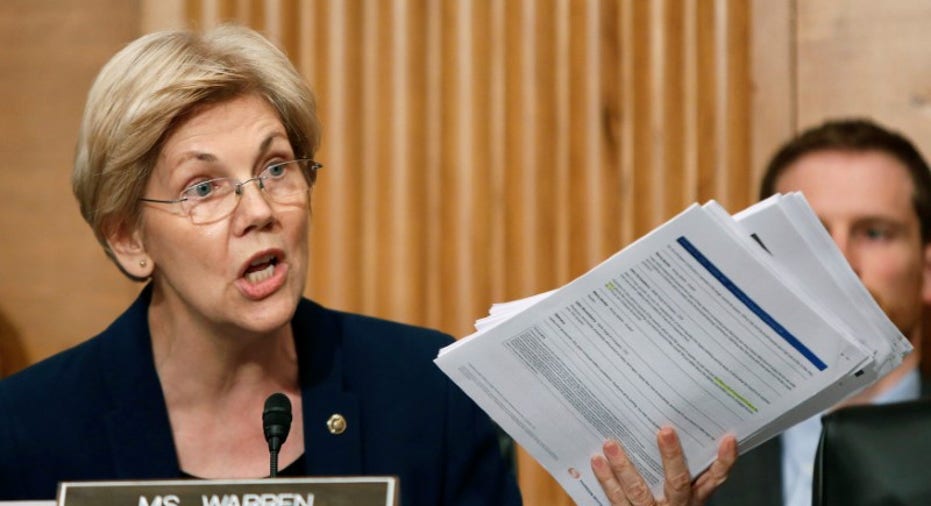Heat rises on Wells Fargo CEO after lawmaker grilling

NEW YORK – Wells Fargo & Co Chief Executive John Stumpf prides himself on being a banker who understands the little guy's financial problems. He has spoken publicly about growing up poor on a Minnesota farm, starting his career as a low-level repo man and being underwater on his own mortgage years ago.
But when called before U.S. lawmakers on Tuesday to answer questions about a scandal at his bank involving 2 million fake accounts that thousands of employees set up in customers' names, Stumpf's answers fell flat.
The white-haired, 63-year-old CEO repeatedly told a congressional panel that he had to check with staff, lacked information or was not an "expert" on a range of topics including executive compensation, credit scores and contracts that must be signed to open an account.
Throughout the hearing, Stumpf was polite, responding to senators' often aggressive questions with a calm, earthy twang. His hand was bandaged and in a splint after "roughhousing" with his grandkids, Wells Fargo spokeswoman Jennifer Dunn said.
"He talks about the team, he talks about the good people ... He smiles, and he's sweet and he's in no way responsible," said Robert Monks, chairman of ValueEdge Advisors, which advises investors on corporate governance issues.
"His response to questions remind me of Muhammad Ali's rope a dope defense ��� he gets up against the ropes, he puts up his hands."
Earlier this month, the lender agreed to pay $190 million in penalties and customer payouts to settle the case involving the creation of credit, savings and other accounts without customers' knowledge. About $5 million will directly go to customers, many of whom might have paid a small fee on the unwanted accounts.
His responses gave plenty of ammunition to critics who point to the scandal as the latest example that some banks are still too big to manage and executives should serve jail time.
Sen. Elizabeth Warren, a Democrat from Massachusetts who frequently lambasts the financial industry, said the only appropriate response to the scandal would be for Stumpf to resign, give back his pay and be criminally investigated. Democratic presidential candidate Hillary Clinton penned an open letter arguing for greater accountability.
Wells Fargo spokesman Mark Folk declined to comment on Stumpf's testimony.
Pressure has been building beyond Capitol Hill for Stumpf and Wells Fargo's board of directors to come up with better answers.
Activist investors including the Needmor Fund and Public Citizen's Bart Naylor have filed motions to split the roles of chairman and CEO on Wells Fargo's proxy and examine whether the bank should be broken up.
The Department of Justice and Federal Bureau of Investigation also have launched probes into the bank's actions following Wells' settlement with the Consumer Financial Protection Bureau and Los Angeles city attorney.
BAD PUBLICITY
Wells Fargo has mostly sought to minimize the problem since its settlement was announced on Sept. 8.
Executives have pointed out that while thousands of employees set up accounts without customers' authorization over five years, they represent a tiny fraction of total staff.
Wells Fargo did not consider the matter to be financially "material," Stumpf told Congress on Tuesday, even though it involved $2.6 million worth of inappropriate fees charged to consumers and resulted in the bank paying $190 million worth of penalties.
Stumpf said he takes responsibility for the problems, and detailed additional steps the bank is taking to address them.
He is not the first Wall Street CEO to have his day before an angry congressional panel and live to tell about it.
Goldman Sachs Group Inc executives, including CEO Lloyd Blankfein, were grilled by lawmakers in April 2010 over a derivative trade that helped the bank profit from the mortgage market's implosion.
In 2011, former MF Global CEO Jon Corzine had to explain how his collapsed firm managed to lose more than $1 billion in customer funds.
And in 2012, JPMorgan Chase & Co CEO Jamie Dimon had to answer for the so-called "London Whale," a wrong-way derivative bet that lost the bank billions of dollars.
But Wells Fargo's problem may be resonating more because it involves regular bank accounts for regular people who faced unjustified fees, rather than arcane derivatives traded by sophisticated investors.
But even if the scandal is more palpable on Main Street, analysts and investors who spoke to Reuters after Stumpf's testimony said it may ultimately matter little to Wells Fargo's bottom line or share price. Its biggest investor, Warren Buffett, has declined to comment on the matter.
The bank turned a $23-billion profit last year and until recently was the most highly-valued bank in the United States.
Even analysts who were critical of Wells' response to the scandal characterized its recent stock decline as a buying opportunity.
"It's not very good publicity for Wells but I think they'll get through it," said Tim Ghriskey, chief investment officer of Solaris Group in Bedford Hills, New York. "It's a cheap stock."
(Reporting by Dan Freed; Additional reporting by Michael Erman and Sinead Carew; Writing by Lauren Tara LaCapra; editing by Diane Craft and Nick Zieminski)



















